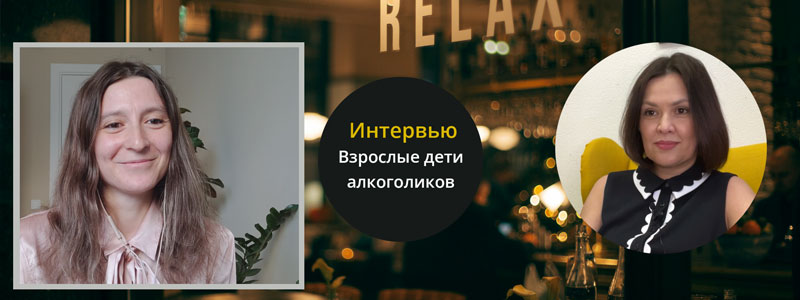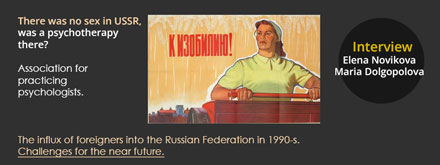Maria Dolgopolova: Hello, Olya! Hello to everyone who came to listen to us. Thank you for signing up for this adventure. I think it is very interesting for us and valuable for those who may be listening to us. I actually met you through the gestalt community. We studied together a bit back in the day.
In connection with this, I will still ask, maybe even closer to the beginning, the question of why you went into psychoanalysis? What was missing in just gestalt? Because I am wildly curious, and maybe someone else will find it interesting as well.
Olga Zaitseva: Well, probably it’s the same as with you, you also went into analysis after gestalt.
Maria Dolgopolova: It's definitely not like me because I know my tangled story… Well, I am Masha Dolgopolova, a clinical psychologist, developing as a Jungian psychoanalyst with experience in gestalt therapy and object relations psychoanalysis training. That's about it. And our topic today is "Adult Children of Alcoholics."
Olga Zaitseva: I welcome everyone and I am very happy to be here. Masha, I don’t know if this is an adventure, but I am very interested in formats where I can talk to a colleague and also interact with someone who is interested in this topic or for whom this topic is relevant. I’ll introduce myself, my name is Olga Zaitseva. I am a certified psychologist by basic education. Then I studied gestalt therapy, and later I went to study clinical cases and got acquainted with the psychoanalytic approach. Now I identify myself as a psychoanalytic psychotherapist or psychoanalytic psychologist working in a psychodynamic approach. I no longer identify myself with the gestalt approach, although I sometimes notice that the method still slips through with some people.
Maria Dolgopolova: A more gestalt contact.
Olga Zaitseva: Yes, more gestalt. I believe that I learned contact there. And of course, I can’t fully call myself a psychoanalyst yet, because I am only planning to go into training. But since my supervision is in the analytical approach, we examine cases in the analytical approach, analyzing transference. And that’s the main part that is not present in gestalt. There is no transference, no analysis of transference, no analysis and no interpretations, which are abundant in the analytical approach, and that’s what interests me more at the moment.
Maria Dolgopolova: Listen, maybe we should just say a word about why we chose this topic. When we talked about this interview, it was your suggestion to discuss adult children of alcoholics. Why do you think it’s worth talking specifically about this topic? Because there are, for example, dysfunctional families in a broader sense. And quite similar manifestations will be seen in children who grew up in dysfunctional families, and in children who grew up in dysfunctional families where the problem is specifically related to alcoholism. Could you explain why this was interesting to you and why you wanted to highlight it?
Olga Zaitseva: Well, you know, yes, you are right, they are very much related. Childhood adverse experiences in a dysfunctional family, but in my opinion, it’s still... A dysfunctional family is one that is in some way connected with the experience of any psychotropic substances, starting with alcohol. And it so happened that I myself come from a family of an alcoholic. This topic is understandable and close to me from the inside. For a very long time, I was embarrassed to talk about it. Then there was some kind of coming out when I was still working at school. And it wasn’t received well because I wrote an article confessing, voicing, and formulating what I notice in myself and what hinders me, hoping that it would resonate with people. That is, they would recognize themselves in it and understand that they are not sick, not some kind of... There are clear symptoms that... I think we will talk about it today.
And if you understand what it is connected with, with this childhood experience, it somehow becomes easier in life. At least you understand what you have, how, and where to go with it. And so it happened, and I have been thinking about this for a long time, how people come to therapy, how they choose therapists. And I notice that many of my patients or people in therapy come from such families. That is, they have this adverse childhood experience related to someone in their family abusing alcohol. There were people from families with drug addiction. I mean, I understand how to work with them, and it seems to me that through my own experience, through working with people, this topic is interesting and relevant to me.
I think a lot about how borderline dynamics, complex post-traumatic... are connected with this experience. That is, all this is revealed, and probably through myself and my practice, it is interesting to me. There is something to talk about here, which is why I proposed it as a topic.
Since I present myself as an analytical psychotherapist, we must maintain neutrality, but in this place, I act as a gestalt therapist. I still talk about the fact that I have this experience, and I can talk about it. And maybe it will be interesting for someone in terms of recognizing it in themselves, people who listen to us will likely recognize it in themselves. They will understand something or maybe decide to go into therapy. Because, I think, it’s very difficult to deal with it on your own. Probably even impossible.
Maria Dolgopolova: Listen, what you are saying is really very interesting and stimulating. You said such a phrase that a dysfunctional family is more often than not somehow connected with psychotropic substances. I come from a different family. And some of my clients are undoubtedly adult children of alcoholics. And some are adult children of emotionally unstable parents, mostly with personality disorders, perhaps severe ones, narcissistic personality disorder, maybe some domestic emotional abuse in the family. And I have quite a few cases where it was not related to psychotropic substances. That is, neither drugs nor alcoholism were involved as such.
And while I was preparing for our interview... In my opinion, a lot of the symptoms that adult children deal with overlap in both cases. That is, if we have a serious malfunction in the family, it results in very specific symptoms in the grown-up children. And in my opinion, many of these symptoms are indeed similar in children of emotionally unstable parents and children of parents with problems specifically related to chemical dependencies. But probably there are some things I have still identified for myself as: "yes, it’s different despite having much in common."
Olga Zaitseva: Listen, have you ever thought about what emotional immaturity of parents is related to? Considering the historical structure, I mean the historical experience of our country after the Great Patriotic War, forgive me, everyone drank. So, one way or another, grandfathers could have been addicted. And I have rarely met families where there are no stories of addiction or co-dependence in this country, I mean a pure story…
Maria Dolgopolova: On my father's side, there is a pure history of non alcoholism and lack of all dependencies, but it was also very interesting for a clinical psychologist, so I… Well, I understand the massiveness of this trend, the massiveness of this trend in Russia due to historical events among other things. But I fell into that narrow niche, both as a specialist and as a grown child, also as a person from childhood, where certain things can generally bypass chemical dependency, but they are also very striking, and the children also go through very striking things as they grow up. But yes, I agree with you, it is, of course, a very widespread problem. That is, maybe, it is the parents of our client or our peer, who are now dealing psychologically with themselves, who were adult children of alcoholics. And this also influences everything.
Olga Zaitseva: Well, yes, we can think either about some kind of transgenerational trauma being passed down from generation to generation. But today we are talking about adult children of alcoholics. And I think, you know, Masha, I really liked it when you wrote "Grown-up Children of Alcoholics," because ACA is, in fact, some kind of global community...
Maria Dolgopolova: Adult Children of Alcoholics.
Olga Zaitseva: Yes. So, they go through a 12-step program, which is very much connected with a religious component. And I think...
Maria Dolgopolova: They position themselves outside of religion and politics.
Olga Zaitseva: Yes, but the entire 12-step program is based on a religious concept of accepting God, accepting fate. As far as I understand. And the ACA program itself seems to imply... And then I wonder how we can talk so that we intentionally overlap with this program, or should we somehow leave it out. I really liked it when you wrote "grown-up children of alcoholics," and here it seems like a separate topic for us.
Maria Dolgopolova: No, well, I don't associate myself with that organization; I am not a practitioner of it. I have read its steps, I have read its methodology on how to conduct it, because I believe that a competent person should know such things. But I don't identify myself with them, and somehow, associatively in my head, I don't know, I can call my clients "grown-up children of alcoholic parents."
I also want to say to those who are listening to us live that I think you now have the opportunity to ask us questions, because if you don't, we will talk about what we come up with ourselves, and perhaps some topics that are significant and relevant to you will be left out. So, you can, in principle, turn on your microphones. Now I will give you this opportunity to everyone I can.
You can now ask your questions, and we will then take them into account in the materials we wanted to give.
Olga Zaitseva: And is it implied that, for example, they can write? Maybe someone is shy to voice a question, but it's easier to formulate it...
Maria Dolgopolova: You know, I don't see a chat here. Of course, they can write, but I'm not sure I'll be able to read it.
Olga Zaitseva: Then yes, it would be great if you have any questions to guide our discussion in an interesting direction for you and take advantage if you are not a psychologist...
Maria Dolgopolova:Ah, guys, I came up with an idea about writing. You can write your questions in the comments to the post about today's broadcast. I can see them here, and if you write something there, we will answer and touch on it.
I think they haven't decided yet, but maybe they will do it closer to the end. Or they're sitting already writing.
Olga Zaitseva: I think, yes. We need to start talking. And in the process of our dialogue, some questions or some memories, some associations related to themselves or something else that will be interesting to ask may come up.
I understand how difficult it is, yes, to ask questions. I always have a hard time asking questions because I have this feature that I understand what I wanted to ask after some time, after what I heard.
Someone is saying hello.
...




